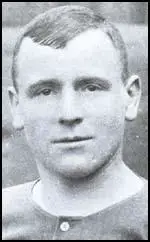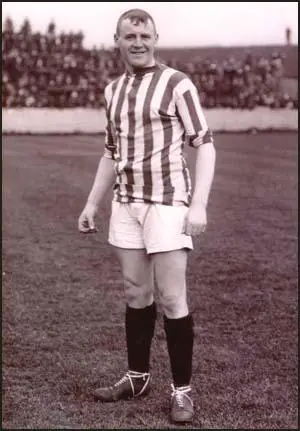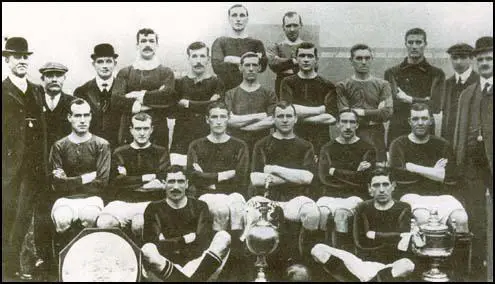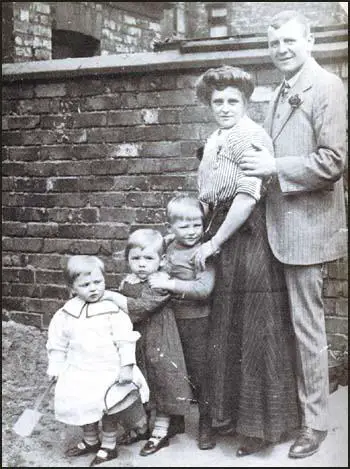Charlie Roberts

Charles (Charlie) Roberts was born in Darlington on 6th April 1883. As a teenager he played football for Bishop Auckland. An impressive centre-half, Roberts signed for Grimsby Town in 1903.
Ernest Mangnall became the new manager of Manchester United that season. After only playing 31 games for Grimsby, Mangnall paid a record transfer fee of £600 for Roberts. At the time Mangnall was criticised for paying such a large sum for such an inexperienced player. However, it proved to be an inspired decision and it was not long before Roberts established himself as the keystone of the Manchester United defence.
Other important signings by Mangnall included Charlie Sagar, Dick Duckworth, George Wall, John Peddie, John Picken, Thomas Blackstock and Alec Bell.
Charlie Roberts upset the Football Association by starting the fashion of wearing very short knickers. In 1904 the FA took action by passing a regulation that stipulated that football knickers covered the knees. Roberts and some other players ignored this regulation. However, it was one of the reasons that long baggy knickers remained fashionable until after the Second World War.
In the 1905-06 season Manchester United won promotion to the First Division when they finished second to Bristol City. The club scored 90 goals in 38 games and top scorers were John Picken (20), John Peddie (18) and Charlie Sagar (16). Manchester United's defence was also impressive and only let in 28 goals that season. Charlie Roberts played at centre-half and he was flanked by two outstanding wing-halves, Dick Duckworth and Alec Bell.
The form of Roberts was so good that the 22 year old won his first international cap playing for England against Ireland on 25th February, 1905. This was followed by games against Wales (27th March) and Scotland (1st April).
Manchester City, who were playing in the First Division, also did well that season. City needed to beat Aston Villa on the final day of the season to win the championship. Villa won the game 3-1 and City finished third, two points behind Newcastle United.
After the game Alec Leake, the captain of Aston Villa, claimed that Billy Meredith had offered him £10 to throw the game. Meredith was found guilty of this offence by the Football Association and was fined and suspended from playing football for a year. Manchester City refused to provide financial help for Meredith and so he decided to go public about what really was going on at the club: "What was the secret of the success of the Manchester City team? In my opinion, the fact that the club put aside the rule that no player should receive more than four pounds a week... The team delivered the goods, the club paid for the goods delivered and both sides were satisfied." This statement created a sensation as the FA had imposed a £4 a week maximum wage on all clubs in 1901.

The Football Association now carried out an investigation into the financial activities of Manchester City. They discovered that City had been making additional payments to all their players. Tom Maley was suspended from football for life. Seventeen players were fined and suspended until January 1907. City was also forced to sell their players and at an auction at the Queen's Hotel in Manchester. The Manchester United manager, Ernest Mangnal signed the outstandingly gifted, Billy Meredith for only £500. Mangnal also purchased three other talented members of the City side, Herbert Burgess, Sandy Turnbull and Jimmy Bannister.
These new players did not make their debuts until the 1st January 1907. Manchester United beat Aston Villa 1-0. The only goal of the game was scored by Sandy Turnbull from a Billy Meredith cross. United only lost four games during the remainder of the season and climbed to an eighth-place finish.
In April 1907 Thomas Blackstock, a colleague at Manchester United, collapsed after heading a ball during a reserve game against St. Helens. 25 year old Blackstock died soon afterwards. An inquest into his death returned a verdict of "Natural Causes" and once again a football player's family received no compensation. Roberts was appalled by the way Blackstock's family was treated and joined up with colleagues, Billy Meredith, Charlie Sagar, Herbert Burgess and Sandy Turnbull to form a new Players' Union.
The first meeting was held on 2nd December, 1907, at the Imperial Hotel, Manchester. Also at the meeting were players from Manchester City, Newcastle United, Bradford City, West Bromwich Albion, Notts County, Sheffield United, and Tottenham Hotspur. Jack Bell, the former chairman of the Association Footballers' Union (AFU) also attended the meeting.
Herbert Broomfield was appointed as the new secretary of the Association Football Players Union (AFPU). It was decided to charge an entrance fee of 5s plus subs of 6d a week. Billy Meredith chaired meetings in London and Nottingham and within a few weeks the majority of players in the Football League had joined the union. This included Andrew McCombie, Jim Lawrence and Colin Veitch of Newcastle United who were to become important figures in the AFPU.
The union activities of Charlie Roberts brought an end to his international career. The Football Association made it clear that they were unwilling to pick players who challenged their authority. Roberts had developed into a fantastic player by 1907. As Garth Dykes (The United Alphabet) has pointed out: "Tall and slim, Roberts tackled, placed and controlled the ball with exceptional ability and was a quite superb pivot who became an inspirational captain of United's first great team during the era prior to the First World War.... Roberts was an outstanding attacking centre half-back with tremendous stamina, who was not only quick off the mark (he could complete 100 yards in 11 seconds!) but was also swift-thinking."
Manchester United started off the 1907-08 season with three straight wins. They were then beaten 2-1 by Middlesbrough. However, this was followed by another ten wins and United quickly built up a good advantage over the rest of the First Division. Although Liverpool beat them 7-4 on 25th March, 1908, Manchester United went on to win the title by nine points. Top scorers were Sandy Turnbull (25), George Wall (19) and Billy Meredith (10).
Mangnall had created an impressive team that was solid in defence and exciting in attack. The former Southampton player, Harry Moger, was a reliable goalkeeper who played in 38 league games that season. Dick Holden (26) or George Stacey (18) competed for the right-back position whereas Herbert Burgess (27) was the left-back. It has been argued that the half-back line of Dick Duckworth (35), Charlie Roberts (32) and Alec Bell (35) was the heart-beat of the side. Billy Meredith (37) and George Wall (36) were probably the best wingers playing in the Football League at the time and provided plenty of service for the inside trio of Sandy Turnbull (30), Jimmy Turnbull (26) and Jimmy Bannister (36). The championship winning team included four players purchased from Manchester City at an auction at the Queen's Hotel in October 1906.

The following season Manchester United enjoyed a good run in the FA Cup. They beat Brighton & Hove Albion (1-0), Everton (1-0), Blackburn Rovers (6-1), Burnley (3-2) and Newcastle United (1-0) to reach the final. Newcastle, who went onto win the league that season, was obviously disappointed by being prevented from winning the double. However, the whole of the Newcastle team waited for 15 minutes in torrential rain aboard an open coach so they could applaud their conquerors after the game.
Jimmy Turnbull (5), Harold Halse (4) and Sandy Turnbull (3) got the goals during the successful cup run that got them to the final at Crystal Palace against Bristol City. As both clubs usually wore red, Bristol played in blue whereas Manchester United played in white shirts with a deep red "V". The game was disappointing and Sandy Turnbull scored the only goal in the 22nd minute.
At the 1908 Annual General Meeting the Football Association decided to reaffirm the maximum wage. However, they did raise the possibility of a bonus system being introduced whereby players would receive 50% of club profits at the end of the season.
The AFPU continued to have negotiations with the Football Association but in April 1909 these came to an end without agreement. In June the FA ordered that all players should leave the AFPU. They were warned that if they did not do so by the 1st July, their registrations as professionals would be cancelled. The AFPU responded by joining the General Federation of Trades Unions.
Most players resigned from the union. All 28 professionals at Aston Villa signed a public declaration that they had left the AFPU and would not rejoin until given permission by the FA. However, the whole of the Manchester United team refused to back down. As a result they were all suspended by their club. The same thing happened to seventeen Sunderland players who also refused to leave the AFPU.
The players put their careers in jeopardy by staying in the union. As Charlie Roberts pointed out: "I had a benefit due with a guarantee of £500 at the time and if the sentence was not removed I would lose that also, besides my wages, so that it was quite a serious matter for me."
Colin Veitch, who had resigned from the AFPU in order to carry on negotiations with the Football Association, led the struggle to have players reinstated. At a meeting in Birmingham on 31st August 1909, the FA agreed that professional players could be members of the AFPU and the dispute came to an end.
Charlie Roberts saw the decision as a defeat for the Association Football Players Union: "As far as I am concerned, I would have seen the FA in Jericho before I would have resigned membership of that body, because it was our strength and right arm, but I was only one member of the Players' Union. To the shame of the majority they voted the only power they had away from themselves and the FA knew it."
When the Manchester United team played in the first match of the season on 1st September, 1909, they all wore AFPU arm-bands. However, it took six months for the players to receive their back wages. Charlie Roberts never got his benefit match and like other union activists was never picked again to play for their country.

In June 1910 Ernest Mangnal purchased Enoch West from Nottingham Forest. West formed a good partnership with Sandy Turnbull and Harold Halse. Billy Meredith supplied them with the kind of service that allowed them to score plenty of goals that season: West (20), Turnbull (19) and Halse (10). On the last Saturday of the season Aston Villa led Manchester United by one point. United had to play third-place Sunderland at Old Trafford whereas Aston Villa had to go to Liverpool.
Manchester United won their game 5-1. Charlie Roberts told the Manchester Saturday Post what happened next: "At the end of the game our supporters rushed across the ground in front of the stand to wait for the final news from Liverpool. Suddenly a tremendous cheer rent the air and was renewed again and again and we knew we were the champions once again." Aston Villa had been beaten 3-1 and Manchester United had won their second championship in four years. Roberts now had two championship winning medals.
In 1913 Roberts joined Oldham Athletic for a transfer fee of £1,750. During his nine years at Manchester United he scored 22 goals in 271 games.
Roberts brought success to Oldham and in the 1914-15 he captained the club to the highest position in the club's history, runners-up to Everton in the First Division championship. He played 72 league games before his career came to an end with the outbreak of the First World War.
After the war Roberts was chairman of the Association Football Players Union. He resigned in September 1921 to become manager of Oldham Athletic. Later he established a wholesale tobacconist business in Manchester. Roberts created a cigarette which he called "Ducrobel" after the Manchester United half-back line of Dick Duckworth, Charlie Roberts and Alec Bell.
Charlie Roberts died at his home in Manchester on 7th August 1939.
Primary Sources
(1) Garth Dykes, The United Alphabet (1994)
Tall and slim, Roberts tackled, placed and controlled the ball with exceptional ability and was a quite superb pivot who became an inspirational captain of United's first great team during the era prior to the First World War.... Roberts was an outstanding attacking centre half-back with tremendous stamina, who was not only quick off the mark (he could complete 100 yards in 11 seconds!) but was also swift-thinking.
(2) John Harding, For the Good of the Game (1991)
Charlie Roberts had been the first to hear that he and his team were to be suspended for publicly stating that they would not resign from the Union: he had read about it in the evening papers delivered to his newsagent's shop: "I had a benefit due with a guarantee of £500 at the time and if the sentence was not removed I would lose that also, besides my wages, so that it was quite a serious matter for me."
The club had told him nothing, however, so he and the rest of the United team turned up as usual at the ground the following Friday to see whether they would receive any pay. No one was prepared to talk to them except an office boy who told them there was no money.
"'Well, something will have to be done,' said Sandy Turnbull as he took a picture off the wall and walked out of the office with it under his arm. The rest of the boys followed suit, and looking-glasses, hairbrushes and several other things were for sale a few minutes later at a little hostelry at the corner of the ground.
I stayed behind a while with the office boy who was in a terrible state over the players taking things away and he was most anxious to get them back before the manager arrived. `Come along with me and I will get them for you,' I said. `It's only one of their little jokes.' I soon recovered the lost property for him. But it was funny to see those players walking off the ground with pictures, etc. under their arms."
Being barred from the ground, the Manchester men decided to continue their pre-season training at Fallowfield, the Manchester Athletic Club ground, secured for them by Broomfield. This turned out to be a publicity coup for the Union, as reporters and photographers arrived to interview and photograph the famous rebels. During one such session Roberts had the happy inspiration that helped create a legend:
"After training a day or two a photographer came along to take a photo of us and we willingly obliged him. Whilst the boys were being arranged I obtained a piece of wood and wrote on it, 'Outcasts Football Club 1909' and sat down with it in front of me to be photographed. The next day the photograph had a front page of a newspaper, much to our enjoyment, and the disgust of several of our enemies."
